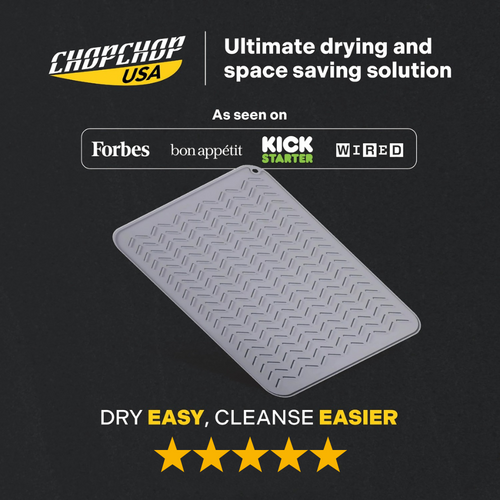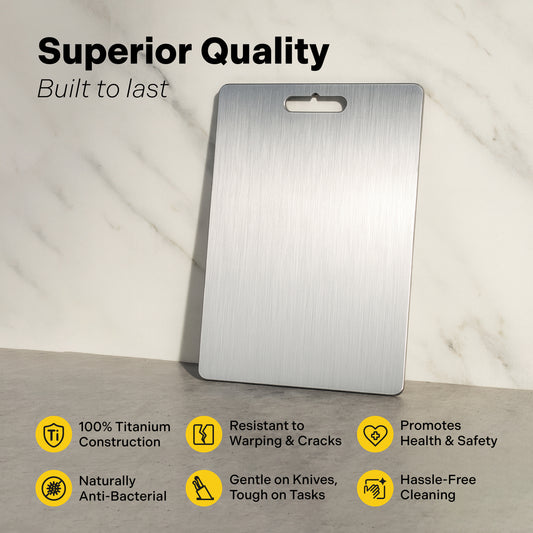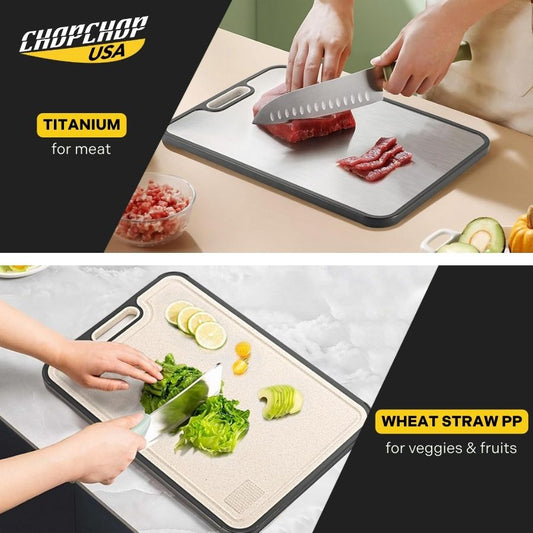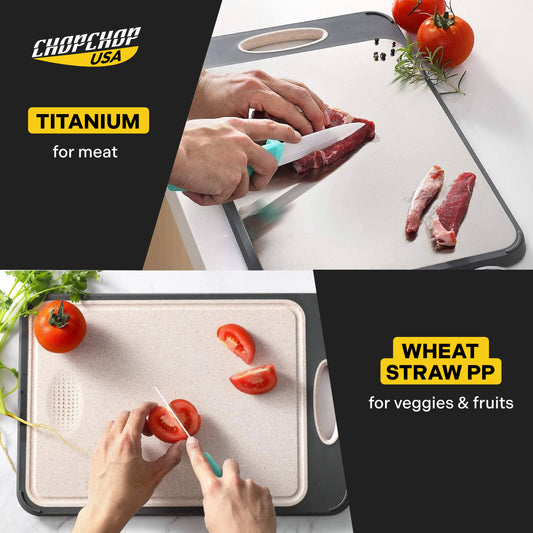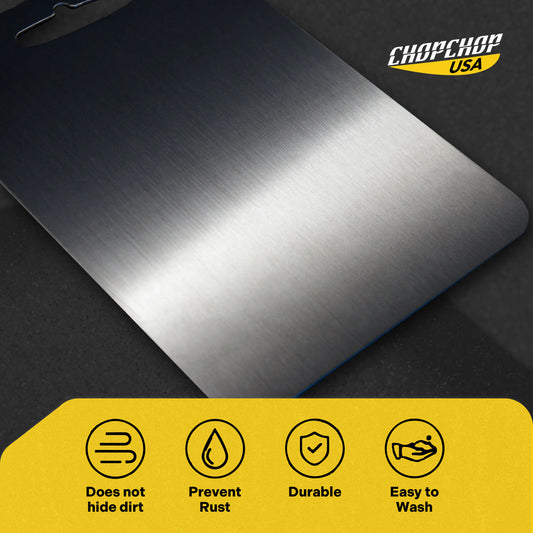In this guide, ChopChop USA explores why you shouldn’t use glass cutting boards, despite their sleek appearance and easy-to-clean design. While they’re often praised for being hygienic and stylish, the truth is they come with several serious drawbacks—especially for your knives, your safety, and your cooking efficiency.
Whether you're a professional chef or home cook, knowing why you shouldn’t use glass cutting boards can help you make smarter kitchen decisions. We'll break down the hidden dangers, compare safer alternatives, and guide you toward better, longer-lasting options for food preparation.
The Appeal of Glass Cutting Boards

Are Glass Cutting Boards Safe? At first glance, glass cutting boards seem like a smart and stylish addition to any kitchen. With their sleek appearance and hygienic surface, they’re often chosen by home cooks looking for an alternative to traditional wood or plastic boards. Below are the most common reasons why glass cutting boards appeal to so many:
Sleek and Stylish Appearance
Glass cutting boards are often admired for their modern, elegant look. They’re available in clear finishes or decorated with intricate patterns, colors, or even printed images—making them a favorite in design-forward kitchens. They can blend seamlessly into minimalist aesthetics or act as a decorative statement piece on the countertop.
Easy to Clean
One of the biggest advantages of glass cutting boards is how simple they are to clean. Glass is naturally non-porous, which means it doesn’t absorb food juices, bacteria, or odors. As a result, users can easily rinse them off, wipe them clean, or place them in the dishwasher without worry. This makes them particularly appealing for people who value low-effort kitchen hygiene.
Resistant to Stains
Materials like wood or plastic can easily become discolored by pigmented foods such as tomatoes, turmeric, or berries. Glass, on the other hand, resists staining even after prolonged use. Its hard, slick surface keeps its appearance intact, which is why many users see it as a longer-lasting, more aesthetically pleasing option.
Non-Porous and Hygienic
Unlike wood, which can harbor bacteria in knife grooves and absorb moisture, glass is completely non-porous. This means it offers a highly sanitary surface for food prep—especially important for raw meats or seafood. For those with strict hygiene standards, this characteristic is one of the main selling points.
Heat-Resistant Surface
Glass cutting boards can withstand exposure to high temperatures without warping, melting, or discoloration. This makes them a dual-purpose tool in the kitchen: they can serve not only as a cutting surface but also as a trivet or surface for placing hot pots and pans directly from the stove or oven.
Low Maintenance
Wooden boards require periodic oiling and plastic boards can warp or degrade over time. Glass cutting boards, in contrast, require no such upkeep. They’re naturally durable, easy to clean, and dishwasher-safe, which adds to their convenience. For busy households or those looking for simple maintenance, this is a major plus.
Why You Shouldn’t Use Glass Cutting Boards

Despite their appealing aesthetics, why you shouldn’t use glass cutting boards is a topic many home cooks overlook. These boards come with a range of drawbacks that can compromise your tools, your safety, and your overall cooking experience.
They Destroy Knife Edges
Are Glass Cutting Boards Bad For Knives? Glass is an incredibly hard, unforgiving surface. Every time your knife contacts a glass board, the edge of the blade takes a hit. Over time—and often quite quickly—your knife will become dull. Understanding why you shouldn’t use glass cutting boards is crucial here: they dramatically reduce knife lifespan, making even expensive blades ineffective sooner than expected.
Slippery Surface = Safety Risk
Another major reason why you shouldn’t use glass cutting boards is safety. Glass boards can become dangerously slippery, especially when wet or covered in juices. This makes slicing and dicing unpredictable and increases the chance of cuts or serious injury.
They Can Break or Chip
One accidental drop and your beautiful glass board could shatter. Even small chips are hazardous, both to your hands and your food. This fragility is a key reason why you shouldn’t use glass cutting boards, especially in high-traffic or family kitchens.
Loud and Uncomfortable to Use
Glass boards produce harsh, clanking sounds with every cut. This jarring noise adds discomfort to cooking and can strain your wrists over time. For those with joint issues, this is yet another reason why you shouldn’t use glass cutting boards for everyday use.
Hygiene is Overstated
Although often touted as more sanitary, scratched glass can harbor bacteria just like any other material. Once etched by knives, the surface may retain food particles that are difficult to clean. This misleading advantage is central to why you shouldn’t use glass cutting boards without understanding their limitations.
In short, glass cutting boards are more form than function. They may look great on your countertop, but they offer little in terms of safety, performance, or durability. For those who take cooking seriously—or simply want a more knife-friendly, practical solution—there are far better alternatives available.
Better Alternatives to Glass Cutting Boards
Here’s how glass compares with other materials—and more reasons why you shouldn’t use glass cutting boards when superior alternatives exist:
Glass vs. Wood Cutting Boards

Are Wooden Cutting Boards Safe? Wood cutting boards remain a favorite among chefs and home cooks alike for good reason. Made from hardwoods like maple, walnut, or acacia, wood boards are naturally antimicrobial and offer a cutting surface that’s much gentler on knives.
Unlike glass, wood won't chip or crack your blades. They also provide a sturdy and stable work surface. However, wood boards do require some upkeep—they should be hand-washed and oiled regularly to prevent drying out or cracking. With proper care, though, a good wood cutting board can last for years and look beautiful doing it.
Glass vs. Plastic Cutting Boards

Are Plastic Cutting Boards Safe? Plastic cutting boards are a popular budget-friendly choice and are often recommended for use with raw meats and seafood. They’re lightweight, dishwasher-safe, and easy to store. However, over time, plastic boards can develop deep knife grooves that trap bacteria, making them less hygienic if not replaced regularly.
While they may seem more practical than glass, they still fall short in terms of knife preservation and long-term durability. Still, they’re a solid option if you're diligent about sanitizing and replacing them often.
Glass vs. Stainless Steel Cutting Boards

Are Stainless Steel Cutting Boards Safe? Stainless steel cutting boards offer superior durability and hygiene. They are resistant to stains, bacteria, and odors, much like glass—but they come with similar downsides when it comes to blade care. The hard metal surface can dull knives quickly, making them better suited for specific prep tasks like working with raw meat or seafood, rather than general chopping.
These boards are commonly found in commercial kitchens, where durability and sanitation are prioritized over knife longevity. They’re a step up from glass in function but still not ideal for everyday slicing and dicing.
Glass vs. Titanium Cutting Boards

Glass vs. Titanium Cutting Boards, which is better? Titanium cutting boards represent the best of both worlds—offering high durability, hygiene, and safety for both your food and your knives. Unlike glass or stainless steel, titanium is slightly softer than typical knife steel, which means it won't dull your blades with repeated use. It's also non-toxic, corrosion-resistant, and non-porous, making it an excellent option for health-conscious cooks.

Are Titanium Cutting Boards Safe? Premium titanium boards from trusted brands like ChopChop USA deliver outstanding quality and innovation. The ChopChop USA Titanium Cutting Board provides a sleek, hygienic prep surface ideal for daily use.

Their Double-Sided Titanium Cutting Board adds even more versatility—featuring one side made from pure titanium for cutting raw meat, and the other crafted from wheat fiber material, perfect for fruits, vegetables, or bread. This dual-surface design not only helps prevent cross-contamination but also caters to a variety of food prep needs with ease and safety. It’s a perfect example of why you shouldn’t use glass cutting boards when better, safer, and more durable alternatives exist.
Conclusion
Now you know why you shouldn’t use glass cutting boards—they’re hard on knives, slippery, loud, and can even shatter. Though stylish and easy to clean, they simply don’t stand up to the needs of serious cooks. Whether you're prepping vegetables or slicing meat, using the right board can make all the difference.
Invest in high-quality alternatives like wood, plastic, stainless steel, or titanium. Especially with ChopChop USA’s premium titanium boards, you'll get longevity, hygiene, and superior performance—a compelling reason why you shouldn’t use glass cutting boards in a modern kitchen.
For more amazing recipes, follow me on Facebook and Instagram! If you have any questions about ChopChop USA's products or promotions, please feel free to contact us at support@chopchopusa.com. Our dedicated team is available 24/7 and always happy to assist you.
Frequently Asked Questions
1. Do glass cutting boards ruin knives?
Yes, and that’s a key reason why you shouldn’t use glass cutting boards. They dull and damage blades quickly.
2. Are glass cutting boards dishwasher-safe?
Yes, most are—but that doesn’t make them the best option for everyday use.
3. Can glass cutting boards shatter?
Absolutely. Their fragility is a safety concern and one of the top reasons why you shouldn’t use glass cutting boards at home.
4. What is the safest cutting board material?
Titanium is one of the safest cutting board material, followed by stainless steel, wood and plastic, depending on use and maintenance.
5. Why are glass cutting boards still sold?
Mostly for their appearance and easy cleaning, but they’re not ideal for serious cooking.


